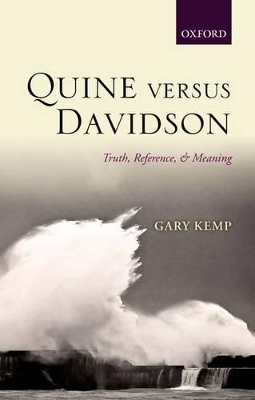
Quine versus Davidson
Truth, Reference, and Meaning
Seiten
2012
Oxford University Press (Verlag)
978-0-19-969562-1 (ISBN)
Oxford University Press (Verlag)
978-0-19-969562-1 (ISBN)
Gary Kemp presents a penetrating investigation of key issues in the philosophy of language, by means of a comparative study of two great figures of late twentieth-century philosophy. He reveals unexplored tensions between the views of Quine and Davidson, and presents a powerful argument in favour of Quine and methodological naturalism.
Gary Kemp presents a penetrating investigation of key issues in the philosophy of language, by means of a comparative study of two great figures of late twentieth-century philosophy. So far as language and meaning are concerned, Willard Van Orman Quine and Donald Davidson are usually regarded as birds of a feather. The two disagreed in print on various matters over the years, but fundamentally they seem to be in agreement; most strikingly, Davidson's thought experiment of Radical Interpretation looks to be a more sophisticated, technically polished version of Quinean Radical Translation. Yet Quine's most basic and general philosophical commitment is to his methodological naturalism, which is ultimately incompatible with Davidson's main commitments. In particular, it is impossible to endorse, from Quine's perspective, the roles played by the concepts of truth and reference in Davidson's philosophy of language: Davidson's employment of the concept of truth is from Quine's point of view needlessly adventurous, and his use of the concept of reference cannot be divorced from unscientific 'intuition'. From Davidson's point of view, Quine's position looks needlessly scientistic, and seems blind to the genuine problems of language and meaning. Gary Kemp offers a powerful argument for Quine's position, and in favour of methodological naturalism and its corollary, naturalized epistemology. It is possible to give a consistent and explanatory account of language and meaning without problematic uses of the concepts truth and reference, which in turn makes a strident naturalism much more plausible.
Gary Kemp presents a penetrating investigation of key issues in the philosophy of language, by means of a comparative study of two great figures of late twentieth-century philosophy. So far as language and meaning are concerned, Willard Van Orman Quine and Donald Davidson are usually regarded as birds of a feather. The two disagreed in print on various matters over the years, but fundamentally they seem to be in agreement; most strikingly, Davidson's thought experiment of Radical Interpretation looks to be a more sophisticated, technically polished version of Quinean Radical Translation. Yet Quine's most basic and general philosophical commitment is to his methodological naturalism, which is ultimately incompatible with Davidson's main commitments. In particular, it is impossible to endorse, from Quine's perspective, the roles played by the concepts of truth and reference in Davidson's philosophy of language: Davidson's employment of the concept of truth is from Quine's point of view needlessly adventurous, and his use of the concept of reference cannot be divorced from unscientific 'intuition'. From Davidson's point of view, Quine's position looks needlessly scientistic, and seems blind to the genuine problems of language and meaning. Gary Kemp offers a powerful argument for Quine's position, and in favour of methodological naturalism and its corollary, naturalized epistemology. It is possible to give a consistent and explanatory account of language and meaning without problematic uses of the concepts truth and reference, which in turn makes a strident naturalism much more plausible.
Gary Kemp is Senior Lecturer in Philosophy at the University of Glasgow. He taught previously at the University of Waikato in New Zealand, and completed his PhD at the University of California. He is the author of Quine: A Guide for the Perplexed (Continuum, 2006), and, with Tracy Bowell, Critical Thinking: A Concise Guide (Routledge, third edition 2009); together with Chris Belshaw, he is also editor of Twelve Modern Philosophers (Blackwell 2009).
Acknowledgements ; Introduction ; 1. Facets of Naturalism ; 2. Davidson's Semantics ; 3. Truth, Deflationism, and the T-schema ; 4. Quine versus Davidson on Reference ; 5. Living with Naturalism ; References ; Index
| Erscheint lt. Verlag | 16.2.2012 |
|---|---|
| Verlagsort | Oxford |
| Sprache | englisch |
| Maße | 145 x 221 mm |
| Gewicht | 384 g |
| Themenwelt | Geisteswissenschaften ► Philosophie ► Logik |
| Geisteswissenschaften ► Philosophie ► Metaphysik / Ontologie | |
| Geisteswissenschaften ► Philosophie ► Sprachphilosophie | |
| Geisteswissenschaften ► Sprach- / Literaturwissenschaft ► Sprachwissenschaft | |
| ISBN-10 | 0-19-969562-8 / 0199695628 |
| ISBN-13 | 978-0-19-969562-1 / 9780199695621 |
| Zustand | Neuware |
| Haben Sie eine Frage zum Produkt? |
Mehr entdecken
aus dem Bereich
aus dem Bereich
ein Gegenentwurf zum kurzfristigen Denken : so werden wir zu den …
Buch | Hardcover (2023)
REDLINE (Verlag)
CHF 27,90
Buch | Softcover (2023)
De Gruyter (Verlag)
CHF 34,90


